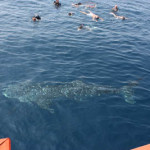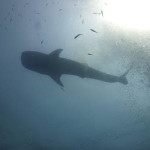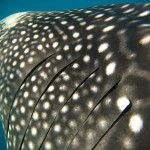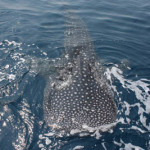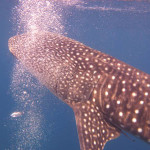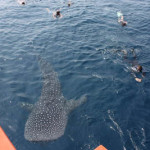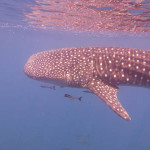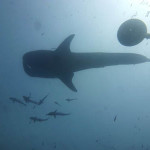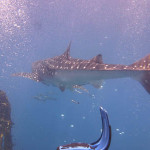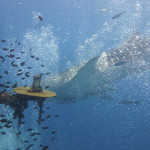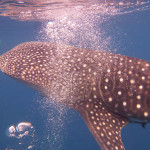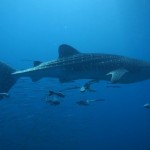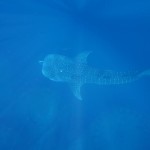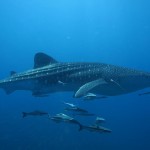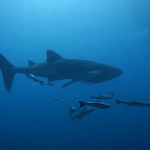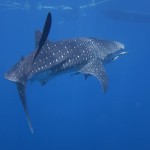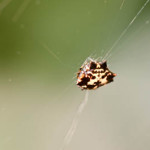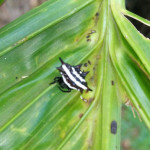Red Lionfish (Pterois volitans)
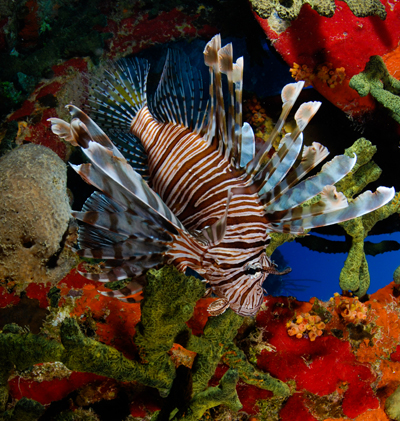
Image Copyright Jonathan Milnes
Observed: Koh Chang Waters
Observed By: Jonathan Milnes
The Red Lionfish is a colourful member of the scorpion fish family that has an array of venomous spines running down its back. Adults can grow as large as 47cm and live up to ten years. Their poison spines are used for protection only. They are rarely fatal to humans but cause extreme pain.
A common treatment is is to soak the stung area in hot water.
Red Lionfish Wikipedia
Bluespotted Ribbontail Ray (Taeniura lymma)
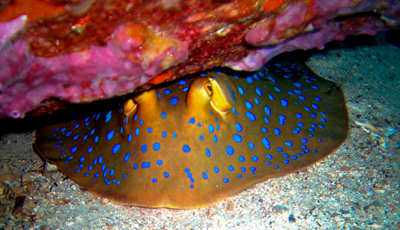
Image Copyright Jonathan Milnes
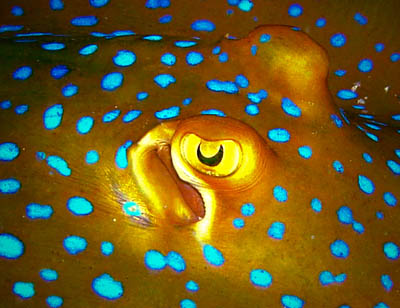
Image Copyright Jonathan Milnes
Observed: Koh Chang Reefs,
Observed By: Jonathan Milnes
The Bluespotted Ribbontail Ray is a beautiful reef-dwelling fish found in the waters around Koh Chang. It is a relatively small ray that doesn’t exceed 35cm in width. It’s poisonous tail spines are able to injure people but it is atimid creature and far more likely to swim away or hide than attack.
Bluespotted Ribbontail Ray Wikipedia
Garden or Writing Spider (Argiope sp., Araneidae)
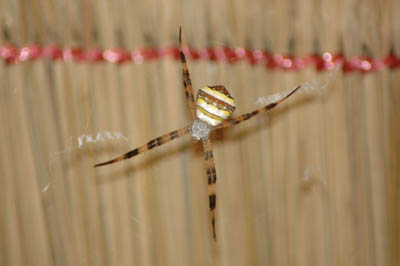
Image Copyright David Newman
Observed: October 2015, Lonely Beach, Koh Chang
Observed By: David Newman
This spider is of the genus Argiope which are commonly known as garden spiders. It looks like the yellow garden spider but since they are common to North and Central America one it probably isn’t unless it hitched a lift in a backpack. It’s a close cousin anyway, feel free to let us know if you find the exact species.
As with most spiders the female garden spider is far larger than the male. They lay 400 to 1,400 eggs. They will kill insect prey up to twice their size and, reassuringly, they are harmless to humans.
Garden Spiders on Wikipedia
Golden Tree Frog (Polypedates sp.)
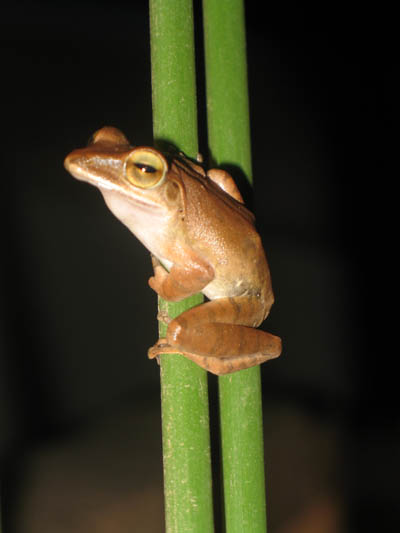
Image Copyright David Hinchliffe
Last Observed: November 2015, Klong Son, Koh Chang
Observed By: Perry Stevens, Dave Hinchliffe, Tijl Adriean
Okay this is a bit of a cheat. You see there are lots and lots of different tree frogs. We know that the ones pictured are in a family of tree frogs known as Whipping Frogs and are native to East, South and Southeast Asia. But it’s hellish difficult to tell the devils apart. Species identification isn’t a learning curve, it’s a learning cliff.
Anyway if there are any herpetologists out there (experts on amphibians and reptiles, in case you were wondering) then please help us improve our definitions down to indivivual species. In the meantime rest assured that Koh Chang has tree frogs, loads of ’em.
Polypedates Frog Wikipedia
Image Copyright Perry Stevens
Image Copright Perry Stevens
Image Copyright David Hinchliffe
Image Copyright David Hinchliffe
Image Copyrigh Tijl Adriaen
Image Copyright Perry Stevens
Image Copyright Perry Stevens
Image Copyright Perry Stevens
Indian Cushion Seastar (Culcita schmideliana)
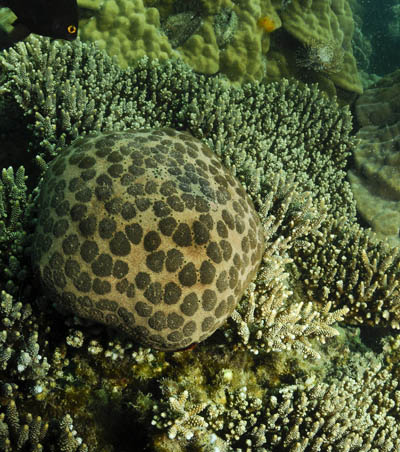
Image Copyright 2010 jonathan Milnes
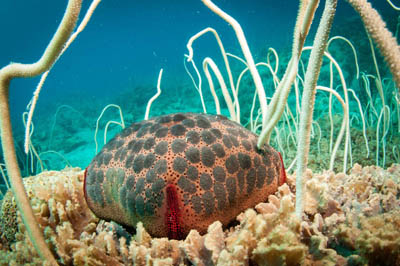 Observed: Koh Chang Reefs, February 2010
Observed: Koh Chang Reefs, February 2010
Observed By: Jonathan Milnes
The Indian Cushion Sea Star is a large and, you guessed it, cushion-like species of starfish found on Koh Chang. It has a a very different shape to the more typical five-armed examples of the starfish family but if you look closely you can still see the pentagonal shape of the animal.
Starfish are not, as many people think, members of the Mollusc family, they are in fact classified along with sea wasps, sea urchins and brittle stars as Echinoderms. I’d be lying if I said that I knew that when I started writing this.
Indian Cushion Seastar
Giant Clam (Tridacna Gigas)
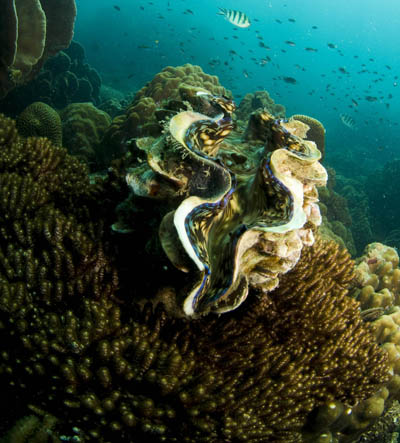
Image Copyright Jonathan Milnes
Observed: Koh Chang Reefs, 2012
Observed By: Jonathan Milnes
The giant Clam is an enormous sea-dwelling mollusc that despite being a common sight on the coral reefs of Koh Chang is actually one of the most endangered species of clam. It is also, yet again for Koh Chang, the world’s largest bivalve mollusc and individuals have beem recorded with weights of up to 200km and measuring 1.2 metres across. that’s a lot of chowder!
Giant Clam Wikipedia
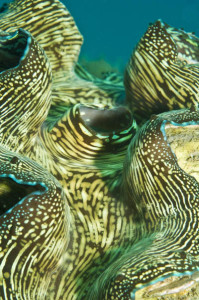
Image Copyright Jonathan Milnes
Orange Sea Whip (Ellisella circidia)
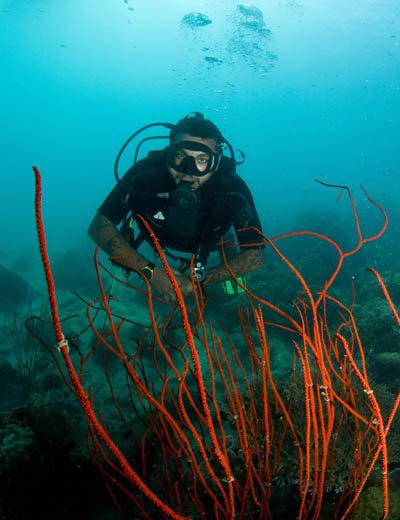
Image Copyright 2010 Jonathan Milnes
Observed: Koh Chang Reefs, 21-02-2010
Observed By: Jonathan Milnes
The Orange Sea Whip is a brilliantly coloured species of Gorgonian coral, a family comprising many species of sea fan and sea whip corals that are characterised by long branching arms. It is fairly common sight on the reefs surrounding Koh Chang.
Whale Shark (Rhincodon typus)
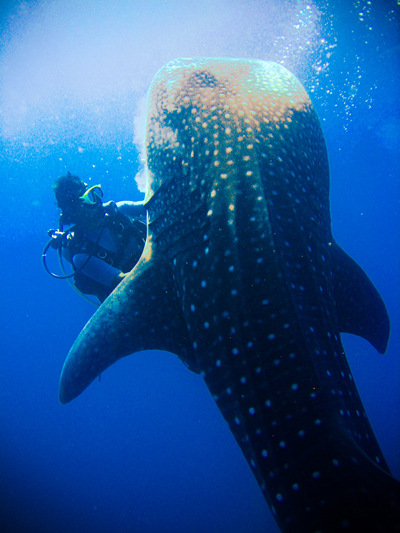
Image Copyright Jonathan Milnes
Last Observed: 2015, Koh Chang
Observed By: BB Divers, Jonathan Milnes, Karin Golsteyn
The Whale Shark is Koh Chang’s biggest visitor by quite some margin. This gentle giant is frequently found in koh Chang waters and a Whale Shark encounter is a unique diving experience. Generally juvenile animals are found in thes ewaters, they are typically (only!) 6-8 metres long. The best way to find out of any recent sightings is to contact the local dive schools on Koh Chang who will be able to tell you.
Whale Shark Koh Chang Guide
Whale Shark Wikipedia
Image Copyright BB Divers
Image Copyright BB Divers
Image Copyright Jonathan Milnes
Image Copyright BB Divers
Image Copyright BB Divers
Image Copyright BB Divers
Image Copyright BB Divers
Image Copyright BB Divers
Image Copyright BB Divers
Image Copyright BB Divers
Image Copyright BB Divers
Image Copyright Karin Golsteyn
Image Copyright Karin Golsteyn
Image Copyright Karin Golsteyn
Image Copyright Karin Golsteyn
Image Copyright Karin Golsteyn
Spiny Orb Weaver (Gasteracanthra cancriformis)
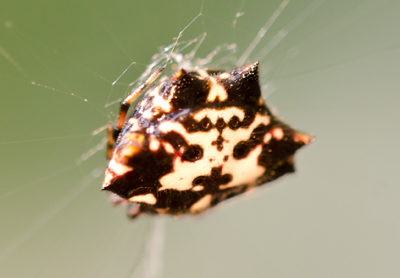
Image Copyright 2015 David Vinot
Last Observed: February 2015, Koh Chang
Observed By: David Vinot
This small spiky shelled little spider is a member of the orb weaver family of spiders. It is found in many tropical locations worldwide and has an impressive number of aliases, being know by the following: the star spider, spiny-backed orbweaver, spiny orbweaver spider, crab-like orbweaver spider, crab-like spiny orbweaver spider, jewel spider, spiny-bellied orbweaver, jewel box spider, smiley face spider or sometimes in the Philippines, the king.
Spiny Orb-Weaver Wikipedia
Image Copyright 2015 David Vinot
NB: Clearly the two spiders pictured are different species of spiny orb-weaver. If someone can identify the black and white one we’ll add another page.
Day-Flying Moth Caterpiller (Cyclosia papilionaris)
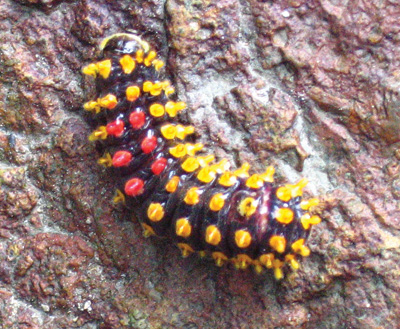
Image Copyright 2005 David Hinchliffe
Last Observed: November 2005, White Sand Beach – Koh Chang
Observed By: Dave Hinchliffe
This astonishing looking caterpillar is in fact the juvenile form of the Day-Flying Moth. It also goes by the more appropriate name of Drury’s Jewel. It is covered in yellow coloured protrusions with just six that are red in colour.
Surprisingly the moth that it eventually transforms into is a simple black and white colour. Where all that colour goes is anybody’s guess.
More information






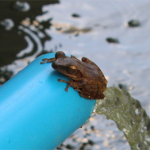
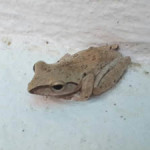
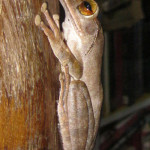
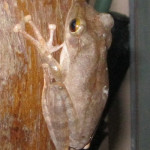
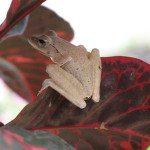
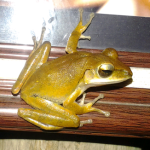
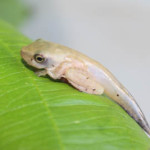
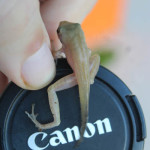
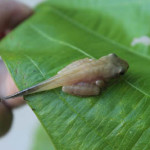

 Observed: Koh Chang Reefs, February 2010
Observed: Koh Chang Reefs, February 2010



